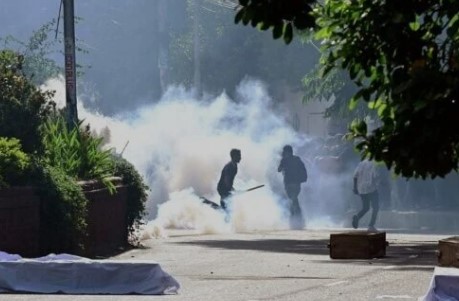In response to escalating violence, Bangladesh has imposed a curfew and deployed military forces following days of intense clashes between student protesters and police. The unrest, which has claimed at least 105 lives, presents a severe challenge to Prime Minister Sheikh Hasina’s Government, which has been in power for 15 years.
Nayeemul Islam Khan, the press secretary for Hasina, announced that the curfew and military deployment would take immediate effect to restore order. This decision follows a ban on public gatherings in the capital Dhaka, which aimed to prevent further violence but failed to stop additional confrontations between police and protesters.
Despite an internet shutdown intended to disrupt rally organisation, protests continued. Sarwar Tushar, a protester who sustained minor injuries, declared, “Our protest will continue. We demand the immediate resignation of Sheikh Hasina. The government is responsible for the killings.”
In a dramatic escalation, student protesters in Narsingdi stormed a jail, freeing inmates and setting the facility on fire. The number of freed inmates is estimated to be in the hundreds.
The violence has resulted in significant casualties, with at least 52 deaths reported in Dhaka alone on Friday. According to hospital sources, more than half of these fatalities were due to police gunfire.
UN human rights chief Volker Turk condemned the attacks on protesters as “shocking and unacceptable,” calling for impartial investigations and accountability for those responsible.
Protesters have targeted police and government offices, including the Dhaka headquarters of State broadcaster Bangladesh Television, which was set on fire by angry students. Additionally, Faruk Hossain, a spokesman for Dhaka Metropolitan Police, confirmed the arrest of Ruhul Kabir Rizvi Ahmed, a leader of the opposition Bangladesh Nationalist Party (BNP).
The unrest stems from student demands to end a quota system that reserves civil service posts for certain groups, which critics argue favours pro-government supporters and entrenches Hasina’s administration. The government’s response has included closing schools and universities indefinitely.
Ali Riaz, a politics professor at Illinois State University, described the protests as an eruption of long-standing youth discontent, viewing the quota system as a symbol of a rigged political system.
A “nation-scale” internet shutdown remains in effect, raising concerns about public safety as connectivity drops to 10 per cent of normal levels, according to watchdog NetBlocks.

















